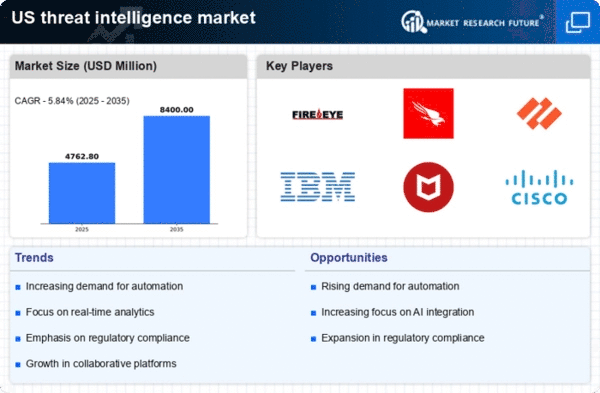Growing Regulatory Pressures
Regulatory pressures are intensifying, compelling organizations to adopt robust cybersecurity measures, including threat intelligence solutions. Compliance with regulations such as the GDPR and CCPA is becoming increasingly stringent, with penalties for non-compliance potentially reaching millions of dollars. In 2025, it is anticipated that the threat intelligence market will see a surge in demand as companies seek to align their security practices with regulatory requirements. This trend is likely to drive the development of tailored threat intelligence solutions that not only address security concerns but also ensure compliance with evolving regulations. As organizations navigate this complex landscape, the integration of threat intelligence into compliance strategies will be crucial.
Rising Cybersecurity Threats
The increasing frequency and sophistication of cyberattacks is a primary driver for the threat intelligence market. Organizations across various sectors are facing heightened risks, with data breaches and ransomware attacks becoming more prevalent. In 2025, it is estimated that the cost of cybercrime in the US could reach $6 trillion annually, underscoring the urgent need for effective threat intelligence solutions. This market is expected to grow as businesses seek to enhance their security posture and mitigate risks. The threat intelligence market is responding to this demand by offering advanced analytics and real-time threat detection capabilities, which are essential for organizations aiming to protect sensitive information and maintain operational integrity.
Emergence of Advanced Technologies
The emergence of advanced technologies, such as artificial intelligence and machine learning, is reshaping the threat intelligence market. These technologies enable organizations to analyze vast amounts of data and identify patterns indicative of potential threats. In 2025, it is expected that the integration of AI-driven solutions will enhance the capabilities of threat intelligence platforms, allowing for more accurate threat detection and response. The threat intelligence market is likely to experience significant growth as businesses increasingly adopt these technologies to bolster their cybersecurity defenses. This trend not only improves the efficiency of threat intelligence operations but also empowers organizations to stay ahead of evolving cyber threats.
Demand for Real-Time Threat Analysis
The need for real-time threat analysis is becoming increasingly critical as organizations strive to respond swiftly to emerging threats. In the current landscape, where cyber threats evolve rapidly, the ability to analyze and act on threat intelligence in real-time is paramount. The threat intelligence market is adapting to this demand by providing solutions that offer immediate insights and actionable intelligence. This shift is likely to drive market growth, as organizations recognize that timely information can significantly reduce the impact of potential attacks. As a result, the market is expected to see a surge in the adoption of technologies that facilitate real-time monitoring and analysis, enhancing overall security effectiveness.
Increased Investment in Cybersecurity
Investment in cybersecurity is witnessing a significant uptick, driven by the recognition of the critical importance of safeguarding digital assets. In 2025, US organizations are projected to allocate over $150 billion to cybersecurity initiatives, with a substantial portion directed towards threat intelligence solutions. This trend reflects a growing understanding that proactive threat detection and response are vital for business continuity. The threat intelligence market is benefiting from this influx of capital, as companies seek to implement comprehensive security frameworks that include threat intelligence as a core component. This investment not only enhances security measures but also fosters innovation within the market, leading to the development of more sophisticated tools and services.
.png)















